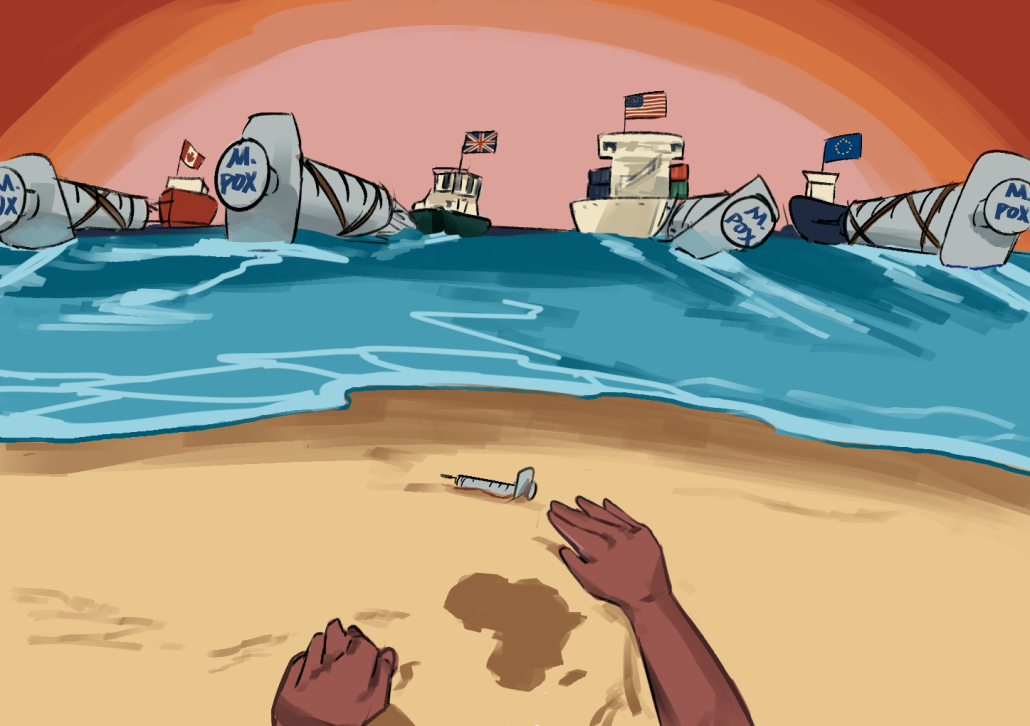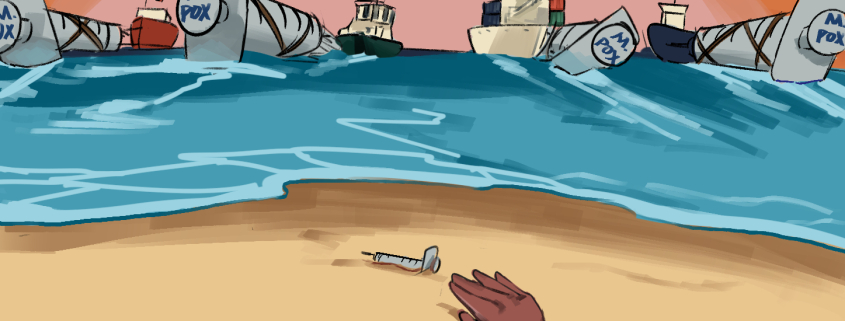Bursting Your Bubble: Africa has zero monkeypox vaccines

Far too many brutal reminders came with the monkeypox outbreak. Queer and trans communities suffered flashbacks to the 1980s HIV/AIDS epidemic — thanks to the Reagan administration dismissing it as a “gay plague” and widespread sentiment that it was “God’s punishment for immoral sexual behavior,”— that killed hundreds of thousands in the United States. Things aren’t as dystopian this time, but barriers are still steep. Anyone who has tried to make a monkeypox vaccine appointment will recall having to navigate a nightmarish digital maze, a process especially daunting for undocumented persons or immigrants who may be hesitant to enter personal information.
In all of this chaos, I can’t help but feel as though there’s one tiny, tiny detail that we’re missing:
Africa — where monkeypox originated and is endemic, where the case fatality rate is 2.9% compared to 0.2% everywhere else — has zero monkeypox vaccines. None.
I looked far and wide in a desperate streak to disprove it. The most recent update I could find was from Sept. 2, when Tedros Adhanom Ghebreyesus, director-general of the World Health Organization, told WHO leadership in Geneva that “we are in touch with Japan” about donating 100,000 doses for research. He did not specify who would receive these donations and how much. But what is certain is Africa isn’t getting enough for even clinical research, never mind public distribution.
Besides that, I encountered the same story over and over again. The U.S. allocated more than one million doses throughout its jurisdictions, as of Sept. 28 — meanwhile letting 20 million smallpox vaccines, also effective against monkeypox, expire. The European Union allocated over 100,000 doses to member states four months ago. But for the rest of the world, silence. The WHO is negotiating with manufacturers to ensure equitable access, which it has long promoted since it declared monkeypox as a global public health emergency, but it can only do so much when the vaccine’s supply is limited and all hoarded by the global North.
So, here we have a set of first-world countries refusing to share their vaccine supply, despite monkeypox now being a slowing (yet continually stable) threat in the West — and a set of third-world countries which must suffer at the expense of the hoarders’ greed.
Medical neglect of Africa by Europe and the U.S. is part of a centuries-long, and still ongoing, pattern of oppression and abuse, and to explain it in any sort of detail would require not a column, but a college history textbook, at least. But I would like to take this time with you to cover a couple highlights:
Coronavirus pandemic
We needn’t go far to find other examples of inequality against Africa. The Brookings Institution reported as of January that 14% of Africans had received at least one dose of a coronavirus vaccine. Every other continent besides Oceania had long surpassed 60%.
The WHO in December 2021 called for “achievement of 70% coverage with [coronavirus] vaccines in all countries as a global imperative.” This goal was feasible, if not perfectly achievable. But as the rich often do, first world countries bought up all the supply and, despite a later surplus, refused to share with the rest of the world. Under the Trump administration, the U.S. rejected COVAX, the WHO’s initiative to provide equitable access to vaccines, and instead initiated Operation Warp Speed, working to accelerate the creation of its own supply. Even wealthy countries within the COVAX alliance hoarded vaccines, ignoring expert warnings that “collective immunity remained out of reach” if they continued to do so.
Now, the West is swinging between declaring the pandemic is over and lamenting that the disease must be lived with — an outcome which was entirely preventable. But oh, well.
HIV/AIDS epidemic
Considerable scientific and social progress since 1981 stabilized the HIV/AIDS epidemic. Sub-Saharan Africa, however, remains “the world’s epicenter of HIV/AIDS,” as the Population Reference Bureau wrote as early as 2002. The Joint United Nations Programme on HIV/AIDS further reported in 2021 that 20.6 million of 38.4 million people living with HIV were in eastern and southern Africa.
For every new treatment against HIV that becomes standard in the U.S., it takes years, if not decades, for the treatment to be made available in Africa. After researchers developed highly active antiretroviral therapy in 1996, it wasn’t until the mid-2000s that sub-Saharan Africans began receiving the treatment. The same was true for pre-exposure prophylaxis (PrEP) — and as of 2016, it was still unavailable through public programs in the region.
Even now, after researchers last year developed a new injectable PrEP, Africans have no idea when they will receive it at an affordable price. Viiv Healthcare, the developer, is blaming the wait on having to lower its prices (in the U.S., the drug is billed at $22,000 annually) while activists accuse them of “dragging their feet.” You can probably guess my conclusion.
Honestly, this blatant repetition of the same “mistake” would be a bit boring if it wasn’t for the fact that hundreds of thousands, if not millions, of lives are at stake because of it. Western governments either don’t know the ramifications of their actions (highly unlikely), or they simply don’t care. It is up to us to break that pattern — and that starts with acknowledging that this atrocious pattern exists.
Jonathan Park is a sophomore writing about international politics outside of Western interests. He is also an assistant news editor for the Daily Trojan. His column, “Bursting Your Bubble,” runs every other Tuesday.

